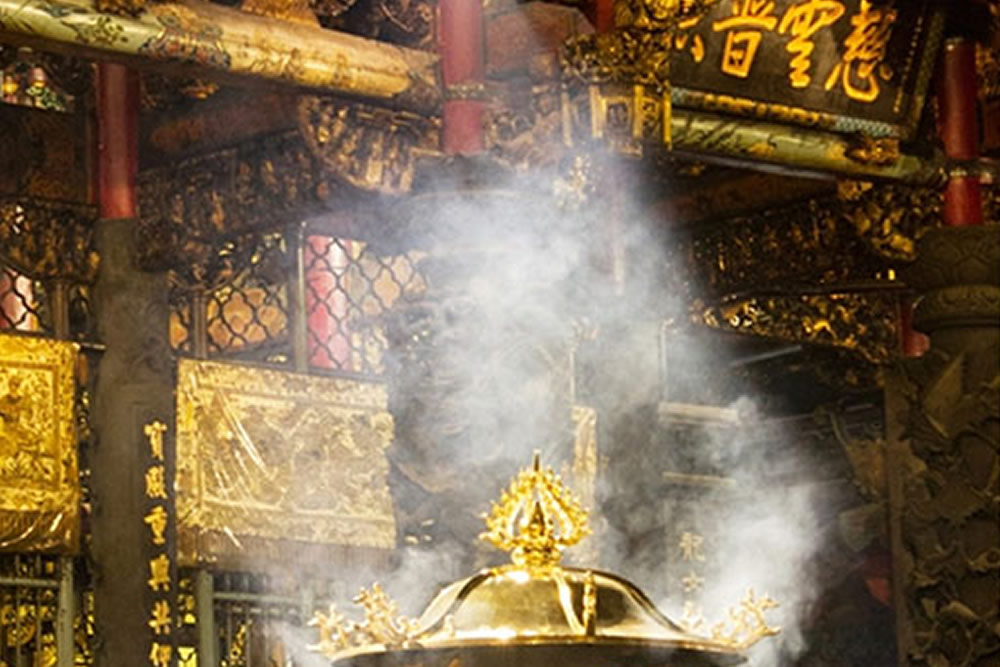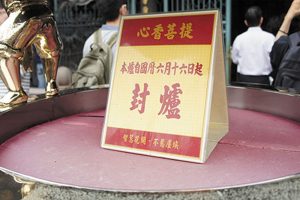
Incense and Censer Reduction at Taipei Lungshan Temple – Effect of AirBox and Big Data Analytics
Realtek Semiconductor Corporation

The results have not only improved the working environment and the health of the staff of the Lungshan Temple, but also elevated the worshippers’ identification with the temple and awareness of health.
INTRODUCTION
Air pollution has become an important environmental and health topic in recent years. Fine suspended particulate matter in the air (PM2.5) has become a focus of global attention. The International Agency for Research on Cancer (IARC) under the World Health Organization (WHO) in October 2013 classified outdoor air pollution, including outdoor particulate matter, as Group 1A carcinogens. In 2015, it was pointed out that about 90% of the world’s population was exposed to an environment where PM2.5 exceeded the safe level.Realtek began PM2.5 product development in 2016 when it cooperated with Taipei City Government in the Taipei Smart City PM2.5 Project, where Realtek donated 300 AirBoxes, jointly developed by Realtek, Edimax, Taipei City Government, and Academia Sinica, for PM2.5 monitoring in every elementary school in Taipei. In the Incense and Censer Reduction Project at Taipei Lungshan Temple, the industry, government, and academia joined forces with the temple to apply AirBoxes to promote public awareness of air quality and personal health, thereby achieving the following:
- Driving temples to think and act to reduce incense and censers step by step, whilst achieving a balance between religion and health
- Promoting the study and communication of knowledge related to PM2.5
- Eliciting public awareness of PM2.5 and raising individual sensitivity to health
FRAMEWORK AND STRATEGY
This project is an excellent example of collaboration of industry, government, academia, and temples. Here, Lungshan Temple sets an example of achieving a balance between religious traditions and health/environmental protection. To achieve the best result, an integrated IC solution, capable of detecting PM2.5, was developed by Realtek semiconductor using an Ameba IoT (Internet of Things) SoC (System-on-Chip). The solution also integrates scientific measurement know-how of the Institute of Occupational Medicine and Industrial Hygiene, National Taiwan University, and health knowledge promotion by Taiwan Lung Foundation.Leveraging its core competency, Realtek joined the development of the AirBox to make it affordable and easy to install; yielding a long-term, real-time, integrated solution to monitor air quality around the Lungshan Temple. Realtek has further helped set up dedicated web pages for the Temple to readily access real-time PM2.5 data collected by the AirBox. Realtek also installed two display monitors showing real-time PM2.5 data in the Temple for those worshippers who may be unfamiliar with the use of Internet and Web browsers to access the data. The direct and constant visual feedback of PM2.5 data has helped the worshippers and visitors be conscientious about PM 2.5 and air quality in the Temple, thereby changing their worship behavior.
ACHIEVEMENT AND IMPACT
The air quality in Lungshan Temple has been greatly improved by this project. PM2.5 readings obtained near the Matsu incense censer and the Tiangong incense censer have dropped by more than 95%. The results have not only improved the working environment and the health of the staff of the Lungshan Temple, but also elevated the worshippers’ identification with the temple and awareness of health. The AirBox has proven itself to be a simple and portable air quality monitoring solution, enabling real-time, effective, fixed location tracking of air quality at a total of 2,134 air quality monitoring sites throughout Taiwan. The Social Return on Investment (SROI) of this project is 2.68. That is, every $1 invested in the project yields $2.68 worth of social value.FUTURE DIRECTION
The Lungshan Temple Incense and Censer Reduction Project echoes the 3rd Sustainable Development Goal, ‘Good Health and Well-Being’. Such sustainability goals are mainly to promote global health and wellbeing; as a side effect they encourage companies to leverage their internal resources and take advantage of the company’s talents to promote the delivery of health services. Realtek in this project leverages its expertise in IC design to raise public awareness of PM2.5 through the AirBox. Realtek expects that AirBoxes will be widely deployed to form a worldwide, air quality monitoring network to further draw global attention to air quality issues. For the future, Realtek will continue to focus on its core competencies and contribute to the sustainable development of global society, environment, and economy.
Founded in 1987, Realtek Semiconductor Corporation is a world-leading IC provider that designs and develops a wide range of IC products for communications network, computer peripheral, and multimedia applications. Since our establishment Realtek has been growing steadily and healthily owing to its excellent tradition of teamwork and innovation in research and development of products and technologies. In 2017, Realtek shipped over 1.7 billion pieces of IC products.





